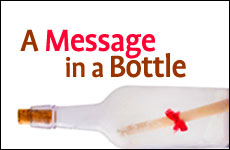 Vampire Weekend's Surprising Jewish Stories
Vampire Weekend's Surprising Jewish Stories


5 min read
The secret of the wise man.
My family was on the tighter side of being loosely affiliated with our synagogue. We attended most any function, as long as it wasn't religious. The youth group director, Mordechai, started a conversation with us during a synagogue brunch that was held in honor of some unusual occasion. After a little while, he asked me a question, "What's stronger, if I slap your hand once very hard, or a lot of times very softly?"
I answered, "Once very hard." Of course.
He seemed to change the topic afterwards and started telling me about how with a bottle and cork, baking soda, vinegar, and a paper towel, you can make the cork shoot out like a cannon. Being a young teen-aged boy, I was fascinated by the idea of making a cannon. We had an empty soda bottle on-hand, but no cork. My parents gave me permission to attend a special "youth group activity" of going to the hardware store to buy a cork.
Mordechai safely returned me to my parents' house later that day, with both the bottle and a cork. We rummaged through the kitchen for the rest of the necessary ingredients, and then brought the whole contraption outside. We shot the cork clear across the back yard, and into the neighbor's yard. I was impressed.
It wasn't until years later that I realized: This cork-cannon was the answer to Mordechai's first question. The many gentle slaps were the same as the chemical reaction inside the bottle -- a slow build-up of invisible gas. The pressure was finally great enough to explode the cork off the bottle. The equivalent of one big slap would be stomping on the bottle (it was plastic). If we did that, the cork would not have traveled so far.
Furthermore, I did not realize that Mordechai was teaching me a fundamental idea of Judaism through this little science experiment. A fool expects to make great accomplishments all of a sudden. In the face of a lengthy task, he despairs. He looks at a full shelf of books and says, "There's so much to learn, I'll never get anywhere." A wise person, on the other hand, focuses each day on the little bit he can accomplish. He looks at the same shelf of books and says, "I'll just do whatever I can today." But page after page, book after book, he eventually masters libraries of wisdom in his lifetime. Slow, gradual, and almost invisible progress often gets us further than a sudden great effort.
Several years ago I began learning half a Mishnah each day and now, to my own surprise, I am moving along through the Talmud.
I have experienced this in my own studies: Several years ago I began learning half a Mishnah each day and now, to my own surprise, I am moving along through the Talmud. Many of my colleagues are still wishing they knew Mishnah, but they are intimidated by the size of the task.
Our lives are filled much more with little things, those seemingly insignificant things, that we do every day. If we look only to the new, and only to the glamorous, then happiness is guaranteed to elude us. My Grandpa Joe, after more than sixty years of marriage, still stands by the sink after dinner and washes up the dishes that he and my Grandma Lakey ate from. With a smile on his face and a cheerful voice he says, "I'm doing my job." There is no visible progress in a lifetime of washing dishes. We do not build a tower of clean dishes. The result is often, instead, that we have built ourselves.
The effort we make every day, though small it may be, is what defines our character. The news of a natural disaster -- with its thousands of hungry and homeless victims -- can move anyone to give charity. But only someone who gives regularly -- a set percentage from every single paycheck -- can be called a charitable person. Despite the popularity of "random acts of kindness," the constant acts of kindness are far superior.
This lesson of cumulative effort is carrying me through the study of life. Usually the goal is not what I have accomplished, but what I have become. As a husband, I strive to constantly be appreciative, thankful, supportive, and understanding. As a father, I strive to constantly be helpful, patient, and cheerful. There may be setbacks (there will be setbacks), but a failure is only one small failure among many successes. The average score is practically unaffected, and even God judges us by the majority of our actions.
I told my children about the cork cannon and we bought special wine for Shabbos -- wine with a cork bottle. This last vacation we walked together to a nearby park, with our cork, bottle, vinegar, baking soda, and paper towels in hand. We shot the cork across the park, with the gentle, invisible power released by the chemical reaction. I am revealing to them the secret of the wise man.
